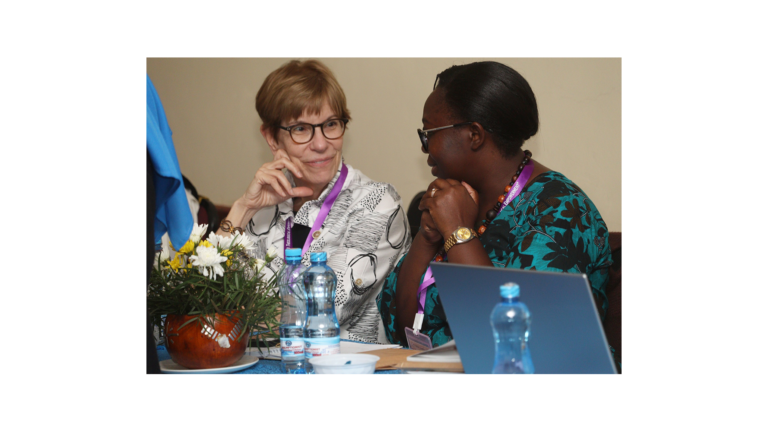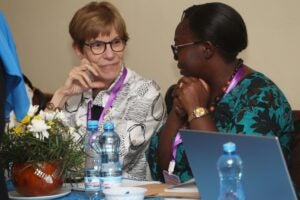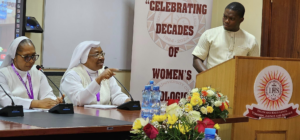
“Palaver”
The concept of “palaver” — talking together, in dialogue — has become an important theme for theologians and people of faith in Africa. Alongside the Church’s Synod on Synodality, palaver points to the importance of gathering together and listening to all voices, including those of women in African women.
At the African Women Theologian’s conference palaver and synodality were abundantly apparent. Hekima University College in Nairobi hosted the conference in March, with the goal of amplifying “the voices of African women in theological discourses and to prompt the well-deserved respectful listening of African women theologians by the Church and society.” The conference clearly achieved its goal.

Women — systematic theologians, canon lawyers, and biblical scholars — gathered from across the continent of Africa and the U.S. and spent four days listening to one another and discussing papers on the theme of synodality. Participants included senior scholars, doctoral students, and practitioners, each of whom discussed a particular issue or situation within the broad context of the Church in Africa — and the crucial importance of including women’s voices.
The time was rich with conversation, questions, dialogue, laughter, and hope — rich with palaver. Let me introduce you to just three of the participants.
Sr. Dr. Florence Adetoun Oso, a systematic theologian, helps direct the Institute of Theology at Sts. Peter and Paul Major Seminary in Ibadan, Nigeria. Oso’s paper, “Voices of Women in a Synodal Church,” noted the hushed voices of women in her local church and others in Africa where women play decorative roles and are treated like statues that adorn the church. She appealed to both scriptural and historical examples of women’s leadership and called for a spirituality of engagement in which the Church listens to women’s voices. Rather than calling for or debating women’s ordination, the need is for women to gain co-responsibility in the Church in Africa.

Sr. Dr. Josée Ngalula gave an historical example of African women’s leadership in her keynote address. Ngalula, who teaches systematic theology in Kinshasa, Democratic Republic of Congo, insisted that the victims of violence, often women, need to be heard. She pointed to St. Josephine Bakhita as an example of an African woman who had the courage to raise her voice against her own enslavement — and whose voice was heard. St. Bakhita’s decision not to return to her owner was appealed to Italian courts, and in 1890 her right to freedom was upheld. Ngalula’s research indicates that most religions are interested in helping victims of violence, but rarely include them in dialogue. Listening to St. Bakhita’s story helps the Church recognize the wisdom and dignity of all humans — and the necessity of including all voices at the table.
Sr. Ivonne Akundo is from Cameroon and currently is enrolled in Hekima University College’s master’s program in Peace Studies and International Relations. Akundo also recognized the importance of including all voices at the table. She noted that in the Cameroon Anglophone Crisis, “the least-known crisis in the world,” not all voices have been heard. Akundo pointed to the synodal process of listening as providing a way forward in Cameroon: involving all groups in dialogue — listening and discerning in new ways , ways in which participants are open to being surprised, to being wrong, and to finding a new way forward.
Palaver — a way forward. When the voices of African women theologians like Srs. Florence, Josée, Ivonne and so many others are heard, the Church in Africa and around the globe will find exactly that — a new, creative, inspired way forward.